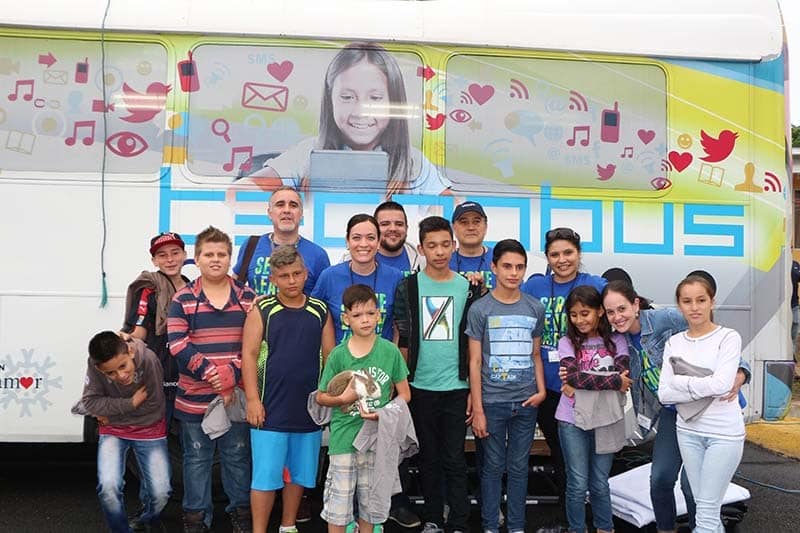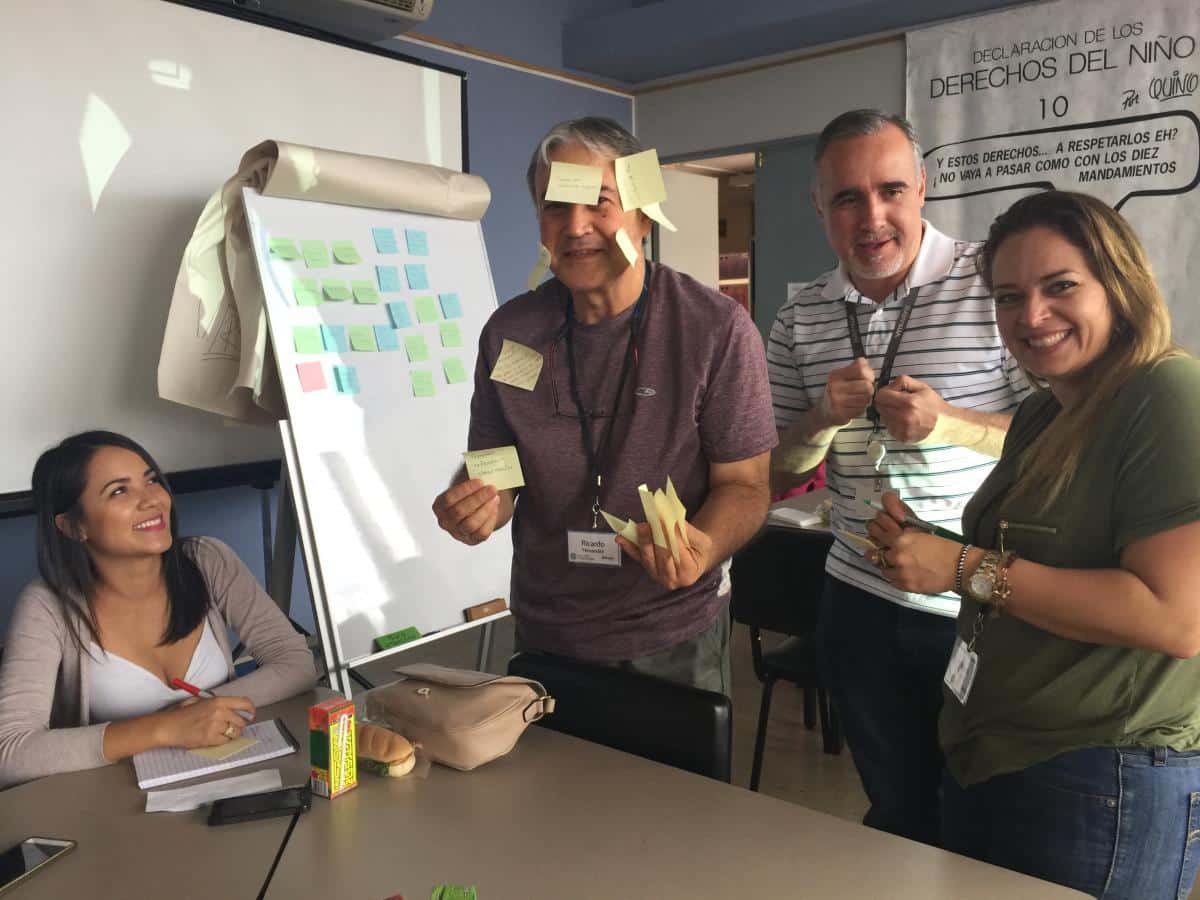
VMware team with youth outside Tecnobus
Goal: Develop and expand the impact of the Service Learning Accelerator, a pilot program developed by the VMware Foundation in collaboration with Team4Tech, which provides an immersive experience where participants serve with a local nonprofit organization by working together on a technology-focused project and learn through a professional development curriculum focused on human-centered design.
Partner: Paniamor Foundation has been preventing violence, promoting policies, and creating social development programs for children and youth in Costa Rica since 1987. They work in communities that commonly suffer from drug abuse and domestic violence. Costa Rica schools with a disadvantaged student population on average have fewer ICT resources than advantaged schools. A significant share of these disadvantaged schools have no ICT resources at all, higher student/computer ratios, and lower shares of school computers connected to the Internet.1
Project:
The Service Learning Accelerator project focused on scaling the impact of Paniamor’s Tecnobus, a bus equipped with cutting edge technology that brings awareness about safe, responsible, and productive use of ICTs to disadvantaged communities. Over the course of five weeks of preparation and one-week on-site volunteering, the VMware Costa Rica Service Learning Accelerator team provided more than 460 hours of volunteer hours for Paniamor Foundation. Specifically they:
- Designed an 8-week curriculum to help Tecnobus deepen their impact with youth. The curriculum content was a result of listening to youth’s needs and interests during a focus group, and gathering feedback from Paniamor’s staff and facilitators. After multiple iterations, the team created an 8-week curriculum with the goal to “Inspire citizen storytelling through practical use of technology to drive change in the youth’s lives.”
- Trained Tecnobus’ facilitators on an 8-week curriculum to ensure the sustainability of the curriculum. The VMware team trained the Tecnobus facilitators on the 8-week curriculum. The team embraced the human centered design approach –staying up late refining the curriculum based on the feedback from Paniamor’s facilitators.
“One of my defining moments was when we went from feeling disillusioned about the training because we realized our materials weren’t aligned with the facilitators’ needs, to being inspired because we incorporated their feedback and created materials that the facilitators were excited about. It was incredible that it all happened within 2 days!” says Ricardo Fernandez, one of the Accelerator participants who is Senior Manager, Site Operations, Global Shared Services of VMware Costa Rica site.
- Proposed a new Tecnobus 2.0 strategy including guidance on finance and preliminary global benchmarking. After spending the first few days collecting information, the VMware team uncovered the need for a new Tecnobus 2.0 strategy. From their research in digging into the Tecnobus financials, and conducting global benchmarking of other Tecnobuses, the team delivered a Tecnobus 2.0 strategy to help increase the impact of inspiring youth through technology.
- Enhanced Tecnobus’ infrastructure with existing resources. One of the VMware volunteers, Jimmy Arias, Technical Support Engineer at VMware was determined to improve the Tecnobus’ infrastructure to enhance the experience for the youth. Jimmy improved the Tecnobus’ network performance and reach, secured the laptops, and installed Intel management software so the facilitators could control over all laptops when guiding the youth through the lessons. He did this all with their existing resources and no additional funding!

Ricardo Fernandez prototyping and brainstorming with Paniamor facilitators

Jimmy Arias and Lila Ibrahim working David (alias) on Tecnobus
Perhaps the most rewarding part of the experience was seeing the enthusiasm among the youth when the team piloted the new curriculum for the first time in the community of Orocai, Orosi, Cartago, which is a two hour drive from San Jose, the capital of Costa Rica. “My dream is to work at a leading technology company,” says one of the teenagers, David (alias) who participated in our Service Learning Accelerator Tecnobus day. The volunteers guided David on how to create a movie about what it takes to be a programmer. Within a few hours they shared the movie with the community. This was the start of a one-week on-site rapid design and prototyping of a curriculum to help youth in Costa Rica use technology in a practical and inspiring way.
Future: Paniamor Foundation plans to implement the Tecnobus 2.0 strategy and new curriculum for its next iteration of the Tecnobus. They will test it with 90 youth starting in September 2016. With the new resources, curriculum, and strategy, Paniamor’s ultimate goal is to broaden and deepen their impact on inspiring disadvantaged youth to use technology in a safe, productive, and creative approach.
This was an incredible experience for the VMware volunteers, the Team4Tech staff, Paniamor staff and facilitators, and the youth. “It was an incredible learning experience, one that I will never forget,” says Melisa Banegas, one of the Accelerator participants who is the Business Analyst for WW Partner Programs at the VMware Costa Rica site.
1. Inequalities in Digital Proficiency: Bridging the Divide – OECD 2015